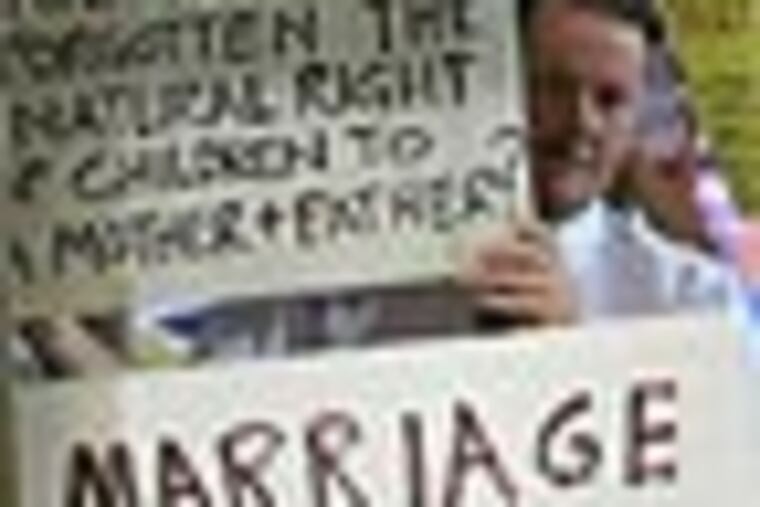Christine M. Flowers: Inalienable rites
SOMETIMES the writing on the wall is in washable markers; sometimes it's carved in marble. I'm starting to think that when it comes to same-sex marriage, we'd better pull out the chisels.

SOMETIMES the writing on the wall is in washable markers; sometimes it's carved in marble. I'm starting to think that when it comes to same-sex marriage, we'd better pull out the chisels.
Recent events nationwide have shown that gay unions are becoming more acceptable, even though the opposition is strong and unwavering in its attempt to save traditional marriage. But with the official end to "Don't ask, don't tell," the attack on California's Proposition 8, the Justice Department's unprecedented refusal to defend the Defense of Marriage Act and New York's legislative battle over so-called "marriage equality," it's fairly clear that the "Rosie O'Donnell" has sung.
By the time our kindergartners reach the age of consent, Adam will be plighting his troth to Steve with the same frequency that he used to do it with Eve. This is due in part to shifting views of homosexuality, as Professor Cass Sunstein has observed:
"America is in the midst of a civil-rights revolution, one that has moved in an extraordinarily short time toward delegitimizing prejudice against and hatred for homosexuals."
BUT WHAT Sunstein fails to say is that this "revolution" has been artificially fueled by the manipulation of constitutional principles in a way similar to what happened in Roe v. Wade. But this time, instead of conjuring up a way to get rid of pesky pregnancies, we've figured out how to bulldoze several millennia of social structure with the phrase "marriage equality" as if the "one man, one woman" standard never really made sense. The battleground has shifted from determining whether same-sex marriage will be legal to how can we protect the deeply held convictions of those who oppose its inevitability. Of course, some people think that any opposition to gay unions is rank bigotry and doesn't deserve any legal protection.
They're particularly hostile to the Catholic Church, which has been a vocal counterpoint to the gay-rights lobby. In New York, for example, Archbishop Timothy Dolan was vilified in the press for demanding more solid protections for clergy and religious institutions that refused to recognize same-sex unions. He has been slandered by pseudo-Catholic Maureen Dowd in the New York Times as a hypocrite who failed to protect children from pedophiles, as if this had any relevance whatsoever to the gay-marriage debate.
And it's not just superannuated columnists who've played the "B-card." New York state Sen. Diane Savino has characterized opponents of same-sex marriage - including many of her own constituents - as "bigots and homophobes" while slamming her door in their faces.
But here's the danger. If and when same-sex marriage becomes an alternative national standard, are we as a country going to stand up for the rights of the conscientious objectors? Or like Dowd, Savino and their ilk, are we going to strip them of their fundamental right to worship by degrading their beliefs as mere "prejudice"?
Whenever we talk about religious objections to same-sex marriage, someone invariably raises the specter of theocracy.
But these same folks don't seem to be equally interested in what happens when someone's spiritual beliefs make them vulnerable to civil or criminal penalties. It's all well and good to say that religious institutions won't have to perform same-sex ceremonies. But that doesn't protect those organizations from civil lawsuits or insulate them from prosecution for hate speech if, for example, a priest were to condemn homosexuality from the pulpit. It also puts their tax-
exempt status in danger.
I ASKED Barry Morrison of the Anti-Defamation League for his take on the tension between religious and civil liberty, and this is what he said:
"Everyone is entitled to the same rights, protections and benefits, including the right to marry. Government-sanctioned discrimination against any group simply has no place in American society. Consistent with this principle, it is the right of religious communities to decide for themselves what relationships they will recognize."
Good as far as it goes. But the First Amendment gives religions the right not only to define their standards for membership and benefits, but also protects them under the free-exercise clause from being discriminated against because of their beliefs.
So unless a minister can feel safe to condemn same-sex marriage without being hauled into court for a hate crime (something that's already happened in Canada and other more "tolerant" countries) and unless a rabbi can refuse to marry a same-sex couple without risking the tax-exempt status of his congregation, the "civil-rights revolution" hailed by Cass Sunstein still has some important battles yet to be fought.
Christine M. Flowers is a lawyer. E-mail
cflowers1961@yahoo.com. She blogs at philly.com/philly/blogs/flowersshow.